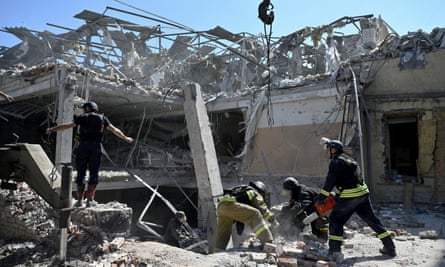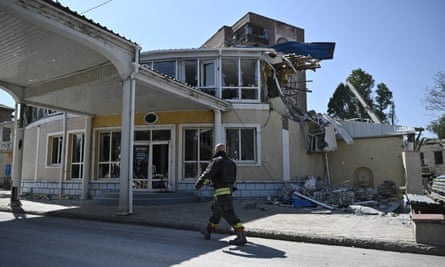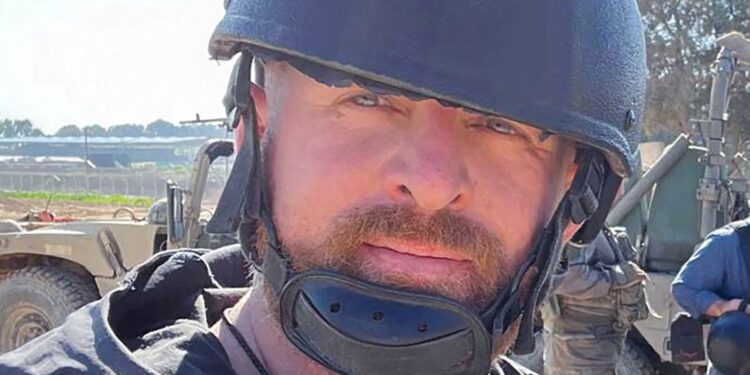Ryan Evans, a safety adviser and former soldier, was staying at the Hotel Sapphire in Kramatorsk when it was hit by Russian missile
A British man working for the Reuters news agency has been killed in a strike on a hotel in the eastern Ukrainian city of Kramatorsk, the news agency has said.
Ryan Evans, who was working as a safety adviser for the agency, was killed after a missile struck the Hotel Sapphire on Saturday where he was staying as part of a six-person team.
Two of the agency’s journalists were being treated in hospital; one of them was seriously injured, it said.
“We are urgently seeking more information about the attack, including by working with the authorities in Kramatorsk, and we are supporting our colleagues and their families,” Reuters said.
Evans, a former British soldier, had been working with Reuters since 2022 and advised its journalists on safety around the world including in Ukraine, Israel and at the Paris Olympics. He was 38.
“We send our deepest condolences and thoughts to Ryan’s family and loved ones. Ryan has helped so many of our journalists cover events around the world; we will miss him terribly,” Reuters said.

The three other members of the Reuters team who were in the hotel at the time of the strike were accounted for and safe, the agency said.
The Ukrainian president, Volodymyr Zelenskiy, said the hotel was hit by a Russian Iskander missile, a ballistic missile that can strike at distances up to 500 km (310 miles).
“An ordinary city hotel was destroyed by the Russian Iskander,” he said in his evening address on Sunday, adding the strike was “absolutely purposeful, thought out … my condolences to family and friends.”
Russia has been bombing hotels in frontline areas for more than a year. A double-tap missile strike on the Druzhba hotel in Pokrovsk, also in the Donetsk region, killed seven people last August. Eleven were injured in a bombing of a hotel in Kharkiv in January.

In the Sumy region, four civilians were reported to have been killed and 13 injured, local police said, on a day in which Russian attacks targeted 50 different sites. The Sumy region borders Russia’s Kursk province, where this month Ukrainian forces launched a surprise cross-border incursion, gaining more than 480 sq miles (1,250 sq km) of territory.
Fighting is still said to be taking place around Korenevo, 15 miles inside the Russian border. Progress north and east of Sudzha, the principal settlement taken by Ukraine, has also been limited in the past week.
On Sunday night, however, Zelenskiy said Kyiv’s forces had advanced up to 3km (1.86 miles) in the Kursk region, taking control of two more settlements there.
Russian officials said five people were killed by Ukrainian shelling in Rakitnoye in the Belgorod region, to the south of Kursk and to the east of the incursion area. The Russian regional governor, Vyacheslav Gladkov, said 13 more were injured.
Ukraine and Russia agreed to swap 115 prisoners of war on Saturday after Kyiv had seized hundreds during the Kursk incursion. However, Zelenskiy was criticised by Denys Prokopenko, the commander of the Azov brigade, for not negotiating the return of the estimated 900 fighters from the unit still held by Russia. “Precious opportunity and time have been lost,” he said.
Zelenskiy, speaking at a joint news conference with the leaders of Poland and Lithuania, said the cross-border incursion had in part been a preventive move to stop Russia taking the city of Sumy. Other objectives included capturing Russian prisoners of war, creating a buffer zone, and some that he could not disclose publicly.
The Ukrainian president also promoted his top military commander, Oleksandr Syrskyi, from the rank of colonel general to full general, in a reward for the success of the incursion, whose careful planning had the hallmarks of the chief of staff.
In Russia, Vladimir Putin held a meeting with the chief of the general staff, Valery Gerasimov. The Kremlin said they discussed “countering enemy forces invading the Kursk region and measures being taken to destroy them”.
The bellicose language was more marked than recent Russian statements, which have generally downplayed the significance of the incursion, describing the response as counter-terrorist.
Source: The Guardian


Recent Comments